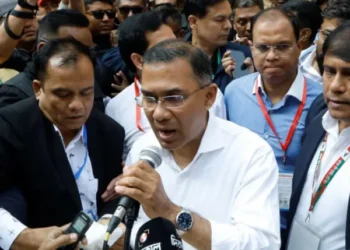Introduction: Mounting Tensions Over Gaza Ceasefire Negotiations
Gaza — The Palestinian resistance movement Hamas has rejected a recent statement made by U.S. President Donald Trump, in which he accused the group of sabotaging peace negotiations and obstructing a potential ceasefire and hostage release agreement. The remark comes amid a sudden collapse of indirect ceasefire talks in Doha, Qatar, that had continued for nearly three weeks with hopes of ending the devastating 21-month-long war between Israel and Hamas.
Hamas leadership, including spokesperson Taher al-Nunno and politburo member Izzat al-Rishq, expressed strong surprise and disapproval of the United States’ decision to exit the negotiations, claiming that the Palestinian side had shown genuine flexibility and commitment to reaching a truce.
The breakdown in the negotiations, coupled with accusatory statements from top U.S. officials, has further intensified diplomatic tensions and raised questions about America’s neutrality in the conflict.
Background: The Qatar-Led Indirect Negotiations
Overview of the Peace Talks
The Doha-based indirect negotiations, mediated primarily by Qatar and Egypt, had been one of the last remaining diplomatic channels seeking a resolution to the ongoing war in Gaza. These talks involved delegations from Hamas, Israel, and intermediaries from the United States, who played an active facilitation role.
Discussions reportedly centered on a multi-stage ceasefire agreement that would include:
- An immediate cessation of hostilities,
- The release of Israeli hostages held in Gaza,
- The release of Palestinian prisoners from Israeli jails,
- A phased withdrawal of Israeli forces from parts of Gaza, and
- The unhindered flow of humanitarian aid into the war-torn enclave.
According to regional media outlets, the talks had made measurable progress in recent days, particularly on the issue of hostage and prisoner exchanges.
Trump’s Statement and Its Fallout
Trump Accuses Hamas of Bad Faith
On Thursday, U.S. President Donald Trump stunned observers by declaring that “Hamas has no real intention of reaching a ceasefire or releasing hostages.” The remarks came shortly after U.S. special envoy Steve Witkoff announced that the U.S. was pulling out of the talks, citing a lack of good faith from the Palestinian side.
President Trump’s assertion was widely seen as one-sided and inflammatory, especially given the secrecy and delicacy that had characterized the talks up until that point.
Hamas Reacts with Strong Denial
In response, Hamas spokesperson Taher al-Nunno told French news agency AFP that President Trump’s statement was “both shocking and untrue”, especially at a time when progress had reportedly been achieved on several key fronts.
“We are surprised by the sudden shift in tone. We were not formally notified of any problems or obstacles in the negotiations. The talks were moving forward in good faith,” al-Nunno stated.
He emphasized that Hamas was fully committed to reaching a just and lasting agreement and accused Washington of undermining the process at a critical juncture.
Blaming Netanyahu: Hamas Shifts Focus to Israeli Intransigence
Izzat al-Rishq: Israel is the Real Obstacle
Izzat al-Rishq, a senior member of Hamas’s politburo, also condemned the U.S. narrative, pointing instead to the government of Israeli Prime Minister Benjamin Netanyahu as the primary source of obstruction in the talks.
“While Hamas showed unprecedented flexibility, the Israeli side reneged on prior commitments, manipulated timelines, and continued military aggression in Gaza,” said al-Rishq.
He added that Netanyahu’s administration had deliberately erected diplomatic and logistical hurdles, such as shifting demands and last-minute changes to agreed terms, which effectively stalled or derailed the discussions.
U.S. Accused of Bias
Both Hamas officials accused the United States of abandoning its mediating role and siding overtly with Israel. Al-Nunno called on Washington to “abandon its political partiality and resume a balanced, credible role in facilitating peace.”
“As long as the U.S. stands firmly behind Netanyahu and turns a blind eye to Israel’s intransigence, a fair resolution will remain out of reach,” he said.
The State of Gaza: A 21-Month Humanitarian Nightmare
War-Torn Enclave Facing Catastrophe
The breakdown of ceasefire talks comes at a time when the humanitarian situation in Gaza has reached catastrophic levels. According to UN and Red Crescent reports, more than 35,000 Palestinians have been killed, with tens of thousands more injured or displaced.
The 21-month-long war has left:
- 90% of Gaza’s hospitals inoperable,
- Severe shortages of medicine, food, and clean water,
- Widespread displacement, with over a million people living in makeshift shelters, and
- Near-total destruction of civilian infrastructure.
Calls for Immediate Ceasefire
Multiple international organizations, including Doctors Without Borders, UNICEF, and the World Health Organization, have urged for an immediate ceasefire, citing unbearable conditions for civilians.
The collapse of peace talks, therefore, is being viewed as a devastating setback for humanitarian relief efforts, further dimming hopes of restoring stability to the region.
Diplomatic Implications and Global Reactions
Qatar and Egypt Express Disappointment
Both Qatar and Egypt, who have invested months into brokering a compromise, have expressed frustration over the abrupt withdrawal of the United States and the blame-game that followed.
A statement from the Qatari Ministry of Foreign Affairs said:
“Diplomatic efforts should not be undermined by unilateral accusations. All parties must commit to the principles of negotiation and mutual respect.”
European and UN Appeals for Calm
The European Union and United Nations have also weighed in, urging restraint and a return to dialogue. UN Secretary-General António Guterres expressed “deep regret” over the failure of the talks and emphasized the urgent need for a sustainable truce to address the unfolding humanitarian crisis.
Why Trump’s Statement Matters: U.S. Role Under Scrutiny
A Shift in U.S. Foreign Policy?
President Trump’s remarks mark a notable shift in tone from the previous weeks, during which U.S. envoys had maintained a publicly neutral position. Analysts suggest that domestic political pressures and Israel’s lobbying efforts may have influenced the White House’s decision to publicly criticize Hamas.
Critics argue that such a stance could jeopardize America’s credibility as a mediator and may encourage further hardline positions from Israel.
Election-Year Calculations?
Some experts believe the statement could be aimed at bolstering Trump’s political image domestically, particularly among pro-Israel voters. However, this move risks alienating key Arab allies and diminishing U.S. influence in the Middle East peace process.
What Happens Next: The Future of Gaza Peace Talks
Prospects for Renewed Negotiations
Despite the setback, diplomatic sources in Doha and Cairo remain hopeful that the talks could be revived in the coming weeks, particularly if international pressure mounts on both parties.
Regional observers note that Hamas has not closed the door on future talks, and a shift in U.S. rhetoric or Israeli policy could reopen negotiations.
International Community’s Role
The international community—especially the UN, EU, China, and Russia—is being urged to step up and play a more proactive role in resolving the crisis. A multilateral framework may provide a more balanced approach than current U.S.-led efforts.
Conclusion: Peace Talks at a Crossroads
The rejection of President Trump’s statement by Hamas highlights the fragility and complexity of ceasefire negotiations in Gaza. With over 21 months of relentless warfare, countless civilian casualties, and a devastated infrastructure, diplomatic failure is not an option for millions of Palestinians.
While blame-shifting and political grandstanding may serve short-term interests, only sincere and neutral negotiations can pave the way for a durable peace. As the war rages on, the world watches — hoping that dialogue, not destruction, will prevail.

























